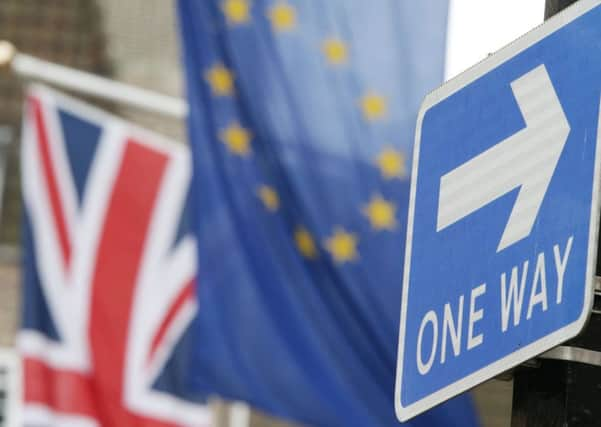YP Letters: Time for a second vote over Brexit?


CHRIS Moncrieff’s reference to “the winning majority” in the EU referendum once again fails to acknowledge that fewer than half of those eligible voted ‘leave’ (The Yorkshire Post, August 8).
The ‘abstainers’ were predominantly the nation’s future, who seem not to have realised that, in many cases, dear old grandad still harboured a smouldering obsession for a return to ‘the good old days’. This is far more important than a football match; petulant cries of “we won – shut up” aren’t good enough.
Advertisement
Hide AdAdvertisement
Hide AdSince June 2016, the youngsters have sprung to life and many of we greybeards have dropped off our comfortable perches. It seems probable that another referendum would produce a different and more representative outcome – truly “the will of the people”. We could then ascribe Brexit to a rather nasty attack of imperial flatulence; say “oops, pardon” and move forward.
However, if this produced Brexit Mk 2, then Remoaners, young and old would be confounded, silenced and resigned to a future of “independent” domination by America – political, cultural and linguistic.
From: Jonathan Doering, Cawthorne.
I WAS saddened to read that statistical research by Leicester University’s Dr Aihua Zhang is being written off as ‘ridiculous’ and ‘offensive’ (The Yorkshire Post, August 8).
If it has been conducted thoroughly and empirically it can be neither of these things – merely a factual statement of data – perhaps not the whole story, but certainly part of it.
Advertisement
Hide AdAdvertisement
Hide AdBoth sides of the Brexit debate have had a slippery relationship with data, and some of the reactions to this research seem to be continuing that relationship. It is unhelpful to accuse an academic study based upon statistical research regarding voting patterns of claiming that non-graduates are ‘thick’, as MEP Mike Hookem has claimed. Dr Zhang has not claimed that. Coming from a family of mainly non-graduates but having had the privilege of a university education myself, I know without Mr Hookem telling me that non-graduates are just as intelligent as graduates.
We all know that there were many reasons for people voting the ways they did in the referendum. What we surely need to do now as a community – Leavers and Remainers, graduates and non-graduates – is to have an informed discussion about how to constructively move forward. We cannot afford to simply name-call and twist each other’s words.
From: Bob Watson, Baildon.
ACCORDING to a study by Dr Aihua Zhang of Leicester University’s mathematics department, Britain may have voted to remain in the EU if more people had a university education.
Understandably, Shipley Conservative MP Philip Davies called this “patronising claptrap.” Indeed, if this sort of study is considered such vital work by Dr Zhang and her university, then one has to wonder whether the work that they do is actually worthwhile at all. Surely there must be matters with a far higher priority? A total waste of time and resources comes to mind here.
From: Hilary Andrews, Nursery Lane, Leeds.
Advertisement
Hide AdAdvertisement
Hide AdI’M sick of being told that I am unintelligent because I voted for us to come out of the EU.
I certainly am intelligent enough to know that statistics can be manipulated to show whatever an investigator wants them to.
Why can’t these Remoaners just accept a result? Would we be bellyaching as much if the result had gone the other way? I think not. We are intelligent enough to respect a democratic vote.
From: J Hutchinson, Kirbymoorside.
I AM appalled at the patronising implication of Dr Zhang (The Yorkshire Post, August 8). Having considered all the pros and cons of the EU, I came to the conclusion that Brexit was the only way to once again become a country to be proud of. Surely universities and other institutions should be spending time and money on the way forward, not on trying to divide the country even more than it is already?
From: Andrew Sanderson, Netherthong, Holmfirth.
Advertisement
Hide AdAdvertisement
Hide AdI FERVENTLY agree with the recent articles by Mervyn King, the governor of the Bank of England for 10 years. His basic premise is to prepare for a hard Brexit to avoid either a ridiculous exit fee (why don’t we get a credit for all the net payments we have made) or a drawn-out bad settlement.
Surely everybody in business or in any negotiation, whether remain or leave, would agree you need to have a credible fallback position – e.g. relying on World Trade Organisation rules. A committee of such experienced individuals would help ensure we achieve either a fair settlement or a clean exit in 2019.
From: Paul Emsley, Hellifield.
THE cynic would say that the reason why our Lord Chief Justice and all the senior lawyers in the United Kingdom want to cling onto the ‘jurisdiction of the European Court of Justice’ is because it brings them in a lot of extra business and fees and keeps them in a job!
Since Magna Carta, British law has been based on ‘case law’, where judges and lawyers have improved the way the law is exercised, by learning from similar cases and judgments.
Advertisement
Hide AdAdvertisement
Hide AdSurely, the Lord Chief Justice knows that? Or, are they just playing ‘Devil’s advocate’, in expressing concern that the laws of the United Kingdom might be jeopardised by our leaving the European Union?
Mr Anthony Blair, who is a lawyer (and so is his wife), burdened the United Kingdom with the EU Human Rights Act; when, I would suggest, our own existing laws were sufficiently robust to protect the rights of all individuals.
Our laws have managed to work with Japan, the United States, China and Russia since 1945. Why not with Europe after 2019?